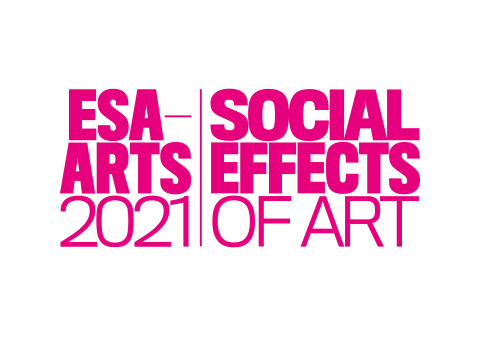Home - ESA arts2021
ESA-Arts 2021 - 11th midterm conference (Online) - THE SOCIAL EFFECTS OF ART
The ESA Research Network Sociology of the Arts hereby announces the midterm conference is 9-12 March 2021 hosted and arranged by the University of the Arts Helsinki. The pre-conference is 8 March 2021.
In light of current situations concerning COVID-19 and corresponding uncertainties that remain globally, we have decided to arrange the online conference. Please note that the conference has been shifted from September 2020 to March 2021. Call for Proposals was closed in February 2020.
The ESA-Arts 2021 conference focuses on the social function and effects of the arts, a defining problem for the discipline. Today many sociologists are busy tackling this issue, because governments and other art funders wish to know if their investments produce social or other external returns. Many types of impact and value assessment schemes have been developed for measurement, monitoring and ranking purposes. The intrinsic value of art is losing significance even in the field of cultural policy. At the same time, social and participatory practices have become popular within art itself, providing an attractive topic for sociological research. These practices are manifold, reaching from applied uses of art in the social and health sector to radical, mobilising activism. Further, many social scientists are working in cross-disciplinary projects that aim to tackle societal problems using art as one of their means. At this point, it is vital for social arts researchers to reconsider their role: are they neutral investigators whose work may benefit all stakeholders, are they bent toward advocacy of art, or are they assisting in the instrumentalization of art, knowingly or not? How much of the evidence that we provide for the social effects of art for the governments is tenable? Which approaches would we apply if we could freely choose how to study the societal significance of art?
Organisers: University of the Arts (Uniarts) Helsinki, Center for Cultural Policy Research CUPORE & European Sociological Association, Sociology of the Arts Research Network (RN2)
Scientific Committee: Anna Lisa Tota, Constance DeVereaux, Olga Kolokytha, Christopher Mathieu, Aleksandra Nenko, Dafne Muntanyola Saura, Valerie Visanich and Sari Karttunen
Local conveners: Kai Lehikoinen, Director, CERADA, University of the Arts Helsinki, and Sari Karttunen, Cupore & Uniarts Helsinki, with the assistance of Maaria Linko, University of Helsinki, and Riikka Haapalainen, Aalto University
Greetings from the organisers (28th of May 2021)
Thank you for joining us at the ESA Arts 2021 Conference earlier this spring. The conference was a great success. The conference featured 111 presentations and workshops with more than 160 speakers and workshop facilitators representing 35 nationalities from Europe and Asia, North America, South America, and Oceania. We also had a good number of non-presenting participants who have actively taken part in discussions.
Our thanks to each and every one of you for your contribution.
In the conference, we learned that the arts and activism continue to make close bedfellows. Such an “unholy matrimony” serves its purpose and produces both artistically and socially meaningful new phenomena. In addition, we learned that the arts continue to have importance in society – now, perhaps more than ever before.
The ongoing Covid-19 pandemic and its many impacts on individual people’s lives, communities, and economies, the social impact of the climate catastrophe, the loss of biodiversity, the Brexit aftermath, geopolitical tensions, as well as rising nationalism, populism, and authoritarianism, pose existential threats to democracy. It is probably fair to say that we live in the age of hyper-uncertainties, where we, as researchers in the sociology of the arts, need to ask how the arts interact with societies. How can the arts help build resilience in confronting the unknown while seeking ways forward, tackling wicked societal and environmental problems, encouraging intercultural dialogue, and serving democracy more generally? How can the arts give hope in these dark times? How can the arts participate in creating better futures?
As promised we have now published the Keynote Lecture by Professors Stephen Duncombe and Steve Lambert from the Center for Artistic Activism (C4AA). Here is a link to a blog post about the lecture and the link to the video.
Warm greetings, stay healthy, stay connected!
On behalf of the organizing committee,
Sari Karttunen & Kai Lehikoinen
CERADA Center for Educational Research and Academic Development in the Arts
The University of the Arts Helsinki
